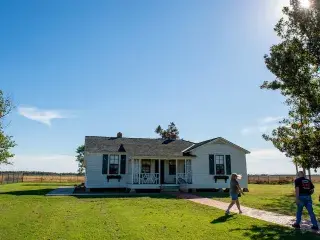Trumann
Trumann is a city in Poinsett County located about 20 miles southeast of Jonesboro and 45 miles northwest of West Memphis. It is in the “sunken lands” region of northeast Arkansas, an area that dropped as much as 50 feet during the New Madrid Earthquakes of 1811-1812.
Trumann got its start like many towns in the region, with timber camps established by the early 1890s along the Frisco railway to haul timber to lumber companies in the north. The town first was named Mosher after an official in one of the lumber companies, then Weona after the Weona Land Company, and finally in 1904 it became Trumann to honor a railroad executive in New York.
The town diverged from other Delta towns, however, in that it soon became a company town for Singer, providing the lumber for the cabinets to house the signature sewing machines. As Singer grew, it began to exercise considerable control over the town. Single workers were housed in clubhouses, with separate facilities for male and female employees. Married workers and their families first lived in company-built shotgun-style houses, and then in neighborhoods of small four-room bungalows. The company also established community utilities, services and amenities, including a facility for large gatherings. Singer continued to dominate life in Trumann until it closed in 1982. A group of businessmen ultimately purchased the large Singer plant complex, divided it into smaller sections, and created an industrial park. Singer’s Community House, now owned by the City of Trumann, is listed in the National Register of Historic Places and continues to host a variety of civic groups and community events throughout the year.
The Maxie Theatre also was a Trumann icon. When it opened in 1947, it was considered one of the most modern theaters in the area. For many years, the Art Deco-style theater was one of the few single-screen movie theaters operating in northeast Arkansas. It closed its doors in 2012 and is listed in the National Register of Historic Places.






